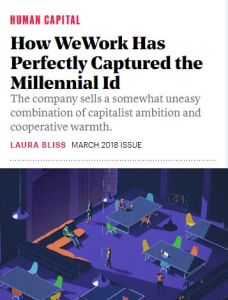Melden Sie sich bei getAbstract an, um die Zusammenfassung zu erhalten.

Melden Sie sich bei getAbstract an, um die Zusammenfassung zu erhalten.
Laura Bliss
How WeWork Has Perfectly Captured the Millennial Id
The Atlantic, 2018
Was ist drin?
You can buy a lot of energy, spirituality and productivity for $20 billion.
Recommendation
Cucumber water, craft beer and hopefully a decent kombucha fountain – these are the accoutrements of the millennial workplace. Throw in a good shuffleboard table, and you’ve apparently got a $20 billion start-up combination. But is WeWork really worth that $20 billion? Laura Bliss, who works at a WeWork co-working location for The Atlantic, explores the ins and outs of the world’s sixth-most valuable start-up. getAbstract recommends her analysis to investors, start-up founders and freelancers.
Summary
About the Author
Laura Bliss writes about transportation, infrastructure and the environment for The Atlantic‘s stand-alone website CityLab.com.
















Comment on this summary